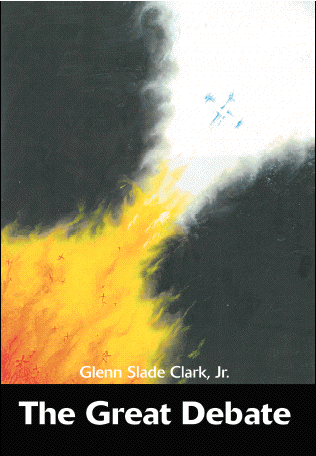
|

|
Trivia
- "The Rainbow-Colored Sheep," the only story to be published on its own prior
to being collected in The Great Debate, was originally written as a response to an anti-gay group within the United
Methodist Church.
- "Six Nights to Damnation" was inspired by a throw-away line in the novel Cry, Wolf
in which an Anthony Paul who knew about the Werewolf Plague of 1850 was mentioned as having moved away in 1995.
- "Reverend Philips is Going to Hell" was originally written as a one-act play for a college
class and was almost left in script form for The Great Debate, until the author decided to revise it and convert
it to prose.
Publication History
- The Great Debate was published in both hardback and trade paperback formats on January
13, 2003.
- The Great Debate was converted to a number of e-book formats on November
23, 2011 by iUniverse, though the author and Clark Ink, LLC were not involved in the process.
- A second edition of The Great Debate was released in both hardback and Kindle
e-book formats on September 25, 2012. The trade paperback release of the second edition was scheduled for release on
June 4, 2013 but was delayed and released on June 7, three days late.
- The second edition was published in PDF e-book format on August 1, 2016. The PDF edition is
a limited release, as a part of the year-long free e-book promotion that began on July 17, 2016 and will
run through July 16, 2017.
- The second edition was published in pocket paperback format on March 7, 2017.
Previous Edition
|

|
| 1st Edition - Hardback |
|

|
| 1st Edition - Trade Paperback |
|

|
| 1st Edition - E-Book |
|
|
|
Current Edition
Advertising
The Great Debate Release Party: April 27, 2003
2003 Web Site Synopsis
Who is the ultimate judge of the world? When God and organized
religion stand at bitter odds with each other, who are we supposed to listen to? The four tales within The Great Debate,
while each fully capable of standing on its own, follow this common theme. This is a book that can be enjoyed by the casual
reader, just as it may come to be treasured by any reader who has ever felt rejected by the Church, even where they are certain
that God is still with them.
The four stories in The Great Debate illustrate both
the pain of gays who feel rejected by the Church, and the joy that comes with realizing that God is by no means subject to
the laws of human society.
|

|

|

